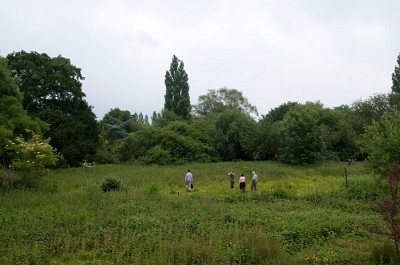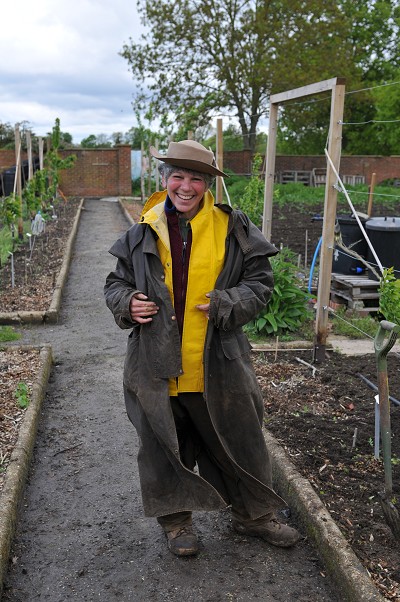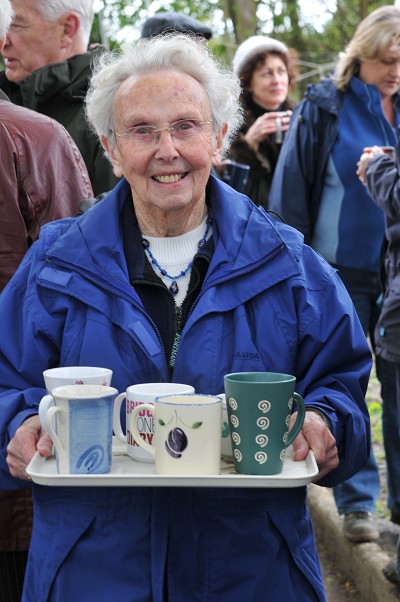
|
GARDEN HISTORY - THE BEGINNING

 One Sunday morning in the spring of 2008, the congregation of St Mary's Church, West Horsley, was set a challenge, namely to devise a project that would benefit the whole community.
One Sunday morning in the spring of 2008, the congregation of St Mary's Church, West Horsley, was set a challenge, namely to devise a project that would benefit the whole community.
For Su Johnston, the inspiration came while listening to a radio programme all about a group of people growing their own vegetables. Soon, amid a flurry of fact-finding, the perfect location presented itself and, in a story that could be straight out of a film, the Grace & Flavour community garden was born. "It was a three-acre, derelict walled garden in the grounds of a nursing home belonging to the National Trust," says Su. "You couldn't actually see the walls because it had 30 years worth of fly-tipping, brambles and nettles at head height, but we just knew it was the right place for us. And so the seeds of Grace & Flavour were sown. We could then embark on the complicated process of setting up the project, which included recruiting a steering committee to develop a business plan, fund-raising and seeking out available grants, but we were on our way. Path to success Delighted with this proposal for the land on their Hatchlands Park estate, the National Trust assisted the group in securing an £8,000 grant from Defra to get the project up and running, while the local borough council in Guildford also agreed to set aside some funding. Members worked diligently to investigate every avenue of fund-raising and were delighted with the support they received from commercial organisations too, who often supplied essential items such as tools and seeds without charge. Few of the 140 members of the original group considered themselves to be skilled gardeners but the scheme quickly took shape, shored up by an early tradition of tea and cake to sustain the hours of hard work required to clear and prepare the land before the planting of the first crops in March 2010. Now 200-strong, the Grace & Flavour group is run as a co-operative with members of all ages, walks of life and circumstances. They pay no fee, but accrue hours spent working on the project to attain different levels of membership that then dictate the price of harvested produce to them.  A member at the highest level will only pay around 20% of the equivalent street price whereas if you only pitch up at harvest time you get around 10% off street price," explains Su. 'Early on in the project, we also made a commitment to distribute 10% of our crops amongst community members who cannot easily access fresh fruit and vegetables. The Tithe, as it is known, has been a real success, not just in the delivery of fresh produce but from the social aspect too. It has brought new people into the garden, such as one lady who decided she didn't need further deliveries and visited the garden to buy some produce. She stopped for the customary tea and cake and now visits a couple of times a month and is on the tea rota.
A member at the highest level will only pay around 20% of the equivalent street price whereas if you only pitch up at harvest time you get around 10% off street price," explains Su. 'Early on in the project, we also made a commitment to distribute 10% of our crops amongst community members who cannot easily access fresh fruit and vegetables. The Tithe, as it is known, has been a real success, not just in the delivery of fresh produce but from the social aspect too. It has brought new people into the garden, such as one lady who decided she didn't need further deliveries and visited the garden to buy some produce. She stopped for the customary tea and cake and now visits a couple of times a month and is on the tea rota.
Spice of life While undoubtedly a community effort, there are little touches of individuality in evidence in the garden. The herb garden was planted in the design of the Union Flag while a former senior air force officer planted purple and white lavender in the formation of airport runway markers up the garden's central avenue. Thanks to one member who was passionate about birds and wildlife, the project now boasts almost 50 bird boxes, and members have been delighted to welcome a baby tawny owl resident this year, as well as a mandarin duck and chicks, multiple robins and much more.  There is a considerably larger skill base in gardening and land management than four years ago, and whilst there is still the occasional growing or cropping mishap (potato blight, rabbits or pea-eating mice among them), the successes far outweigh them. Crops are now available nearly 52 weeks a year and the garden is almost fully utilised. The group still welcomes novices though, and not everyone needs to don their wellies to be a member; some offer their skills in terms of administrative support, legal advice or fund-raising.
There is a considerably larger skill base in gardening and land management than four years ago, and whilst there is still the occasional growing or cropping mishap (potato blight, rabbits or pea-eating mice among them), the successes far outweigh them. Crops are now available nearly 52 weeks a year and the garden is almost fully utilised. The group still welcomes novices though, and not everyone needs to don their wellies to be a member; some offer their skills in terms of administrative support, legal advice or fund-raising.
A sub-committee works on the garden planning while another works on social events. This is everybody's garden; it really is a co-operative," says Su. "It is a hugely positive project and everyone remains very much in forward gear. There have been some challenges along the way; for example, the gardeners can disagree with each other's methods, but they are deeply respectful of each other. When we started, the biggest difference of opinion we had was that some of the gardeners were committed to organic and some weren't. But actually, over time, we just gradually stopped using chemicals wherever we could because nobody liked using them, we didn't want our children eating them and they appeared to have limited benefit anyway. Digging for victory At last year's Surrey Life Food and Drink Awards, Grace & Flavour was recognised with the coveted Food and Drink Hero award, just one of many successes of which they can be proud. Over time, the scheme has become part of the fabric of the village, with new friendships forged over the digging fork (and kettle) and new social networks extended way beyond the garden wall.  It has also helped to bond the villages of East and West Horsley, with parish councils, church members and residents all working together and enjoying social gatherings such as barbeques, cheese and wine events and the annual garden birthday party each March. Visiting groups have included local youngsters who have created scarecrows for the garden, and scouts who have helped with building bug homes and digging duties. There are also organised sowing and birdwatching activities.
It has also helped to bond the villages of East and West Horsley, with parish councils, church members and residents all working together and enjoying social gatherings such as barbeques, cheese and wine events and the annual garden birthday party each March. Visiting groups have included local youngsters who have created scarecrows for the garden, and scouts who have helped with building bug homes and digging duties. There are also organised sowing and birdwatching activities.
Notable guests have included the Duke of Gloucester who visited in May 2012 after The National Trust released 1,200 plots of land to local communities, as part of their on-going support for sustainably produced local and seasonal food. One of Grace & Flavour's 26 private allotments, located alongside the garden, was plot number 1,000 and their royal guest performed an official handover to the Brown family, also stopping to plant a Diamond Jubilee rose.  While the allotments help to deliver recurring revenue to the project, from the beginning, costs have been sufficiently managed through donations and produce sales. Larger-scale activities, such as the current project to renovate the potting shed, which will also provide shelter for wet days and make the garden more accessible for more vulnerable members and visitors, are financed through fund-raising or from specific grants. As always with the team, the practical ambition of the garden is twinned with the spirit of inclusion and accessibility for all.
While the allotments help to deliver recurring revenue to the project, from the beginning, costs have been sufficiently managed through donations and produce sales. Larger-scale activities, such as the current project to renovate the potting shed, which will also provide shelter for wet days and make the garden more accessible for more vulnerable members and visitors, are financed through fund-raising or from specific grants. As always with the team, the practical ambition of the garden is twinned with the spirit of inclusion and accessibility for all.
A United Community "The aims of Grace & Flavour have come true in spades," reflects Su. "We now have a beautiful, functioning garden that continues to be a phenomenal success. The path to it has been filled with coincidences, fortuitous meetings, wonderful people and more humour than you would believe. "There can't be many community schemes that have such broad-ranging appeal or who can claim to work together in the same way. I get really passionate about this aspect of Grace & Flavour. For me, community fixes everything. It is about knowing and caring about the people around you. When you get community, everything else falls in behind it." 
Courtesy of Clare Saul, Surrey Life.
|
| FIND US | CONTACT US | |
|
Grace & Flavour CIC The Walled Garden Dene Place Ripley Lane West Horsley, Surrey KT24 6JW email: mail@graceandflavour.org 
|
|
|